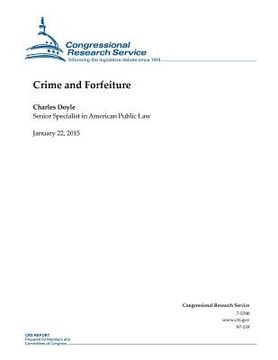Synopsis "Crime and Forfeiture (in English)"
Forfeiture has long been an effective law enforcement tool. Congress and state legislatures have authorized its use for over 200 years. Every year, it redirects property worth billions of dollars from criminal to lawful uses. Forfeiture law has always been somewhat unique. By the beginning of the 20th century, however, legislative bodies, commentators, and the courts had begun to examine its eccentricities in greater detail because under some circumstances it could be not only harsh but unfair. The Civil Asset Forfeiture Reform Act (CAFRA), P.L. 106-185, 114 Stat. 202 (2000), was a product of that reexamination. Modern forfeiture follows one of two procedural routes. Although crime triggers all forfeitures, they are classified as civil forfeitures or criminal forfeitures according to the nature of the procedure which ends in confiscation. Civil forfeiture is an in rem proceeding. The property is the defendant in the case. Unless the statute provides otherwise, the innocence of the owner is irrelevant-it is enough that the property was involved in a violation to which forfeiture attaches. As a matter of expedience and judicial economy, Congress often allows administrative forfeiture in uncontested civil confiscation cases. Criminal forfeiture is an in personam proceeding, and confiscation is possible only upon the conviction of the owner of the property. The Supreme Court has held that authorities may seize moveable property without prior notice or an opportunity for a hearing but that real property owners are entitled as a matter of due process to preseizure notice and a hearing. As a matter of due process, innocence may be irrelevant in the case of an individual who entrusts his or her property to someone who uses the property for criminal purposes. Although some civil forfeitures may be considered punitive for purposes of the Eighth Amendment's excessive fines clause, civil forfeitures do not implicate the Fifth Amendment's double jeopardy clause unless they are so utterly punitive as to belie remedial classification. The statutes governing the disposal of forfeited property may authorize its destruction, its transfer for governmental purposes, or deposit of the property or of the proceeds from its sale in a special fund. Intra- and intergovernmental transfers and the use of special funds are hallmarks of federal forfeiture. Every year, federal agencies share among themselves the proceeds of jointly conducted forfeitures. They also transfer hundreds of millions of dollars and property to state, local, and foreign law enforcement officials as compensation for their contribution to joint enforcement efforts.

